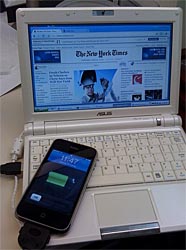 In mobile communications the term “tethering” refers to sharing a cell phone’s data connection with another computing device. It’s most commonly associated with linking a laptop to a data-enabled phone so a user can take advantage of the phone’s Internet connection.
In mobile communications the term “tethering” refers to sharing a cell phone’s data connection with another computing device. It’s most commonly associated with linking a laptop to a data-enabled phone so a user can take advantage of the phone’s Internet connection.
Tethering can have a significant impact on mobile networks since tethered computers tend to use up a lot more bandwidth than mobile phones. This was likely one of the reasons AT&T was so slow to allow the tethering functionality of the iPhone on their network (it appeared more than a year after Apple announced the iPhone’s tethering capabilities.) And when AT&T finally did open up their network for tethering, users had to pay $20 extra per month for the feature.
Now we’re seeing AT&T sending warning notices to users it suspects of using unauthorized tethering apps and Google allowing mobile carriers to block these kinds of apps from appearing in the Android store. While many have complained about these actions, it’s not surprising that the carriers would try to limit tethering to sanctioned apps and users who have opted to pay more for tethering functionality. Allowing jailbroken iPhones to tether or Android apps like PdaNet, Easy Tether, and InternetSharer that facilitate tethering without the carrier’s approval is seen by the carriers as taking money out of their pockets. (Google appears to be allowing carriers to filter the Android store to block these apps for their users, but the apps are still available and installable).
The cat-and-mouse game between carriers and unauthorized tethering is still going strong, however. For example, here’s a recent tweet from the folks behind PdaNet:
.bbpBox64346260651524097 {background:url(http://a3.twimg.com/a/1303834694/images/themes/theme1/bg.png) #C0DEED;padding:20px;} p.bbpTweet{background:#fff;padding:10px 12px 10px 12px;margin:0;min-height:48px;color:#000;font-size:18px !important;line-height:22px;-moz-border-radius:5px;-webkit-border-radius:5px} p.bbpTweet span.metadata{display:block;width:100%;clear:both;margin-top:8px;padding-top:12px;height:40px;border-top:1px solid #fff;border-top:1px solid #e6e6e6} p.bbpTweet span.metadata span.author{line-height:19px} p.bbpTweet span.metadata span.author img{float:left;margin:0 7px 0 0px;width:38px;height:38px} p.bbpTweet a:hover{text-decoration:underline}p.bbpTweet span.timestamp{font-size:12px;display:block}
3.0 adds a feature to hide tether usage. Most users do not need to turn it on unless you have received a message from such as T-Mobile.
This really all boils down to the fact that “unlimited” has a unique meaning in terms of mobile data plans. Cellular carriers have long been criticized for liberally using that word in situations where the service isn’t truly unlimited, and their desire to make users pay more for tethering is another example of how that unlimited data plan you thought you had, really isn’t unlimited. Many have faulted AT&T for their network issues and how long it took them to officially allow tethering, but at least they’ve clarified their data plans and language — you won’t find the word “unlimited” in their rate plan descriptions anymore.
Where does this lead? Even though customers have made it clear they feel tethering charges are unfair, the carriers have made it equally clear they plan on monetizing this feature as much as possible. With both AT&T and Verizon clamping down on unauthorized tethering, the climate for people who want to tether for free will continue to get more restrictive. But it’s important to note that unlike the situation with AT&T and iOS devices, where you must jailbreak the device to get around the carrier’s tethering restrictions, on the more open Android platform there will likely always be free tethering options for those who are willing to go outside of the official store for apps and don’t mind breaking their carriers’ terms of service.
Photo: iPhone -> eee pc tether. by paul_irish, on Flickr
Related:
